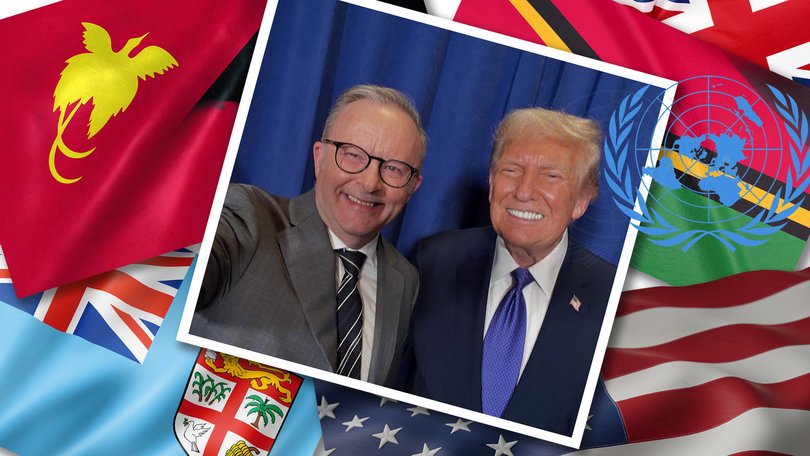EDITORIAL: Foreign policy fails could come out in the wash
EDITORIAL: Should the Pentagon’s review of the AUKUS partnership continue to head in the right direction, Albanese’s fumbles of the past month could become just a footnote in our foreign policy history.

Last month was an absolute shocker in terms of foreign policy from Anthony Albanese.
Twice the Prime Minister travelled to Pacific nations hoping to sign wide reaching security deals aimed at shutting down Chinese aspirations for greater influence.
Twice he left empty-handed and red-faced. Then, a hoped-for sit down with Donald Trump on the sidelines of the United Nations General Assembly in New York was reduced to a quick selfie and promise to catch up soon — following a public dressing down by the US President of Mr Albanese and like-minded leaders for their premature push for unconditional Palestinian statehood.
Sign up to The Nightly's newsletters.
Get the first look at the digital newspaper, curated daily stories and breaking headlines delivered to your inbox.
By continuing you agree to our Terms and Privacy Policy.For a chap who fancies himself somewhat of an international statesman, it was a humbling experience, and not at all what he had imagined would come of his September spent jetsetting around the globe.
Never mind that. New month, fresh start.
Mr Albanese’s October has started on a decidedly higher note.
Papua New Guinea’s Cabinet has now signed off on the Pukpuk treaty — albeit a few weeks later than originally scheduled.
The sighs of relief from Canberra could be heard in Port Moresby.
The Pukpuk agreement is Australia’s first such alliance in 70 years, and elevates PNG to the level of the US and New Zealand as one of our chief security partners.
With only a few kilometres separating Australia and PNG at the nations’ closest points, the security of PNG is inseparable from our own.
The treaty will allow for up to 10,000 Papua New Guineans to serve in the Australian Defence Force and increase interoperability between the two nations’ militaries.
It will compel Australia and PNG to come to one another’s aid in the event of a foreign attack.
And crucially, it prevents both parties from entering into deal with third parties which would compromise the treaty’s aim, a clause which effectively shuts down any courtship of PNG by Beijing.
It’s a foreign policy win that was sorely needed by an Australian Government which was beginning to look outfoxed by China at every turn.
While Mr Albanese is not a man who lacks for self-belief, it should provide a boost all the same as he tries to put back on track the deal with Vanuatu which was similarly scuttled at the last minute.
Should that agreement also overcome its false start, then these recent failures would be largely forgiven and forgotten. They could be waved away as minor setbacks, instead of concerning indications of our waning influence and authority within our own region.
And in just a few weeks, Mr Albanese will face an even greater test when he sits down for the first time in a formal capacity with the present leader of our No. 1 security guarantor.
Recent days have seen Canberra more confident that the Pentagon’s review of the AUKUS partnership is heading in the right direction, and Mr Trump will give his blessing for Australia to go ahead with its purchase of American nuclear submarines.
Should that come to pass, Mr Albanese’s fumbles of the past month would be just a footnote in our foreign policy history.
